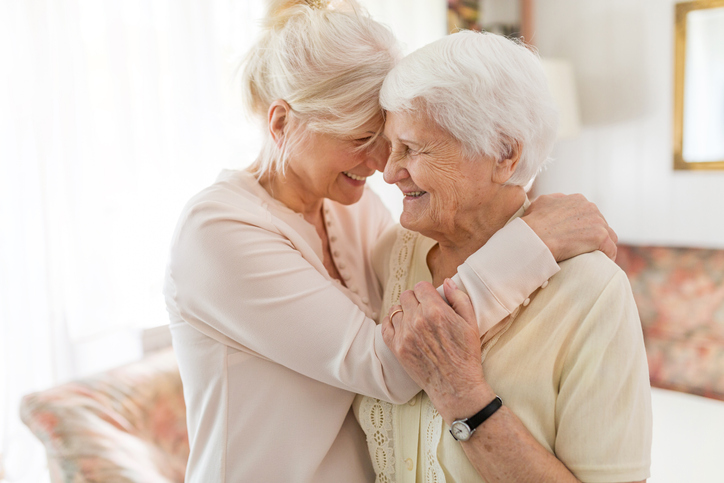Dementia and Alzheimer’s disease can be easier to cope with if you have the right help. Our guide explores how to make the home safe and enjoyable for loved ones who may be coping with these issues.
According to the National Institute on Aging, Alzheimer’s disease has a significant impact on a large portion of the elderly population. If your family member or loved one is coping with the signs of Alzheimer’s or dementia, it’s important to create a safe place for them at home. With a few easy updates and some positive reinforcement, you’ll discover some helpful ways you can make simple changes to ensure a safer environment.
The Importance and Benefits of Elder-Proofing
More of the elderly population are choosing to “age in place,” which means they’d rather stay in their homes instead of going to a nursing home or assisted living facility. You can keep your loved one safe by making some easy changes in their home. The term “elder-proofing” refers to things you can do to ensure that your loved one is safe and secure while living at home. These simple safety tips include minor updates to the home so they’ll be able to live in a safe and enjoyable home into the future. When you elder-proof a home, you’ll get peace of mind knowing you’ve taken as many precautions as possible to make sure they’re safe.
Besides peace of mind and improved safety, elder-proofing a home is usually much less expensive than paying for in-home care or a nursing home. Many older Americans have already paid off their mortgages, which means it’s significantly less expensive to allow them to stay at home. Putting a few safety precautions in place can ensure that the patient is secure and able to handle an unexpected emergency. With a few simple home safety upgrades, your Alzheimer’s disease or dementia patient can stay in their home, resulting in a happier, healthier life.
What to Expect
When you prepare to elder-proof a home, make sure that your loved one understands what you’re doing and why. Explain to them that you’re making these changes for their safety and that you want them to be able to enjoy their home for as long as possible. While you certainly want them to maintain a certain level of independence, it’s important to note that many dementia patients may tend to wander or leave their homes without supervision, so you’ll need to take this into consideration when creating your safety plan.
Be prepared to remain on alert and have your contact information posted somewhere prominent in the home in case of an emergency. A monitoring system can help your loved one alert health officials in the event of an emergency. No matter what you do to elder-proof the home, make sure it doesn’t interfere with their routine. Sticking to a schedule may help your loved one feel calm and safe even if you make a few changes to their home.
Adapting Each Room
There are several things you can do to every room of the home that will make it safer and more enjoyable. Here are some suggestions for how you can improve home safety to protect the well-being of your loved one:
Bedroom
- Remove space heaters and heated blankets to reduce the risk of fire.
- Add a nightlight in the bedroom as well as in the bathrooms and hallway so your loved one can see better at night.
- Get rid of excess clutter in this room so that the patient can easily walk around and avoid tripping over items on the floor.
- Install a lock on the bedroom windows when applicable so that your loved one does not try to open it. Window locks may also help prevent accidents.
Kitchen
- Make sure all smoke detectors are working properly, particularly in the kitchen and bedroom.
- Move items that are high up in cabinets down to the lower level so your loved one doesn’t have to strain to reach items that are too high.
- Consider adding an area rug to the kitchen and attach it to the floor using a strong double-sided tape to provide better traction on smooth floors.
- Prominently display emergency phone numbers on the refrigerator and make sure there is a telephone nearby.
Bathroom
- Install grab bars in the bathtub and shower to help the patient get in and out of these areas more easily.
- Use a bathtub tread or a non-slip tub mat to help your loved one stay safe from falls in the tub and shower.
- Consider adding an elevated toilet seat and install a grab bar next to the toilet.
- Unplug any small appliances in the bathroom and use childproof outlet covers to prevent fires.
- Cover faucets with a soft material like a sponge or foam to avoid accidents.
Stairs
- Make sure there is a light switch at the top and bottom of any stairs so your loved one can see as they walk up and down the stairs at night.
- Add stair treads, even if the stairway has carpet since this will improve traction.
- Ensure that the stairs have a railing and that it’s tightly secured to the wall.
- Clearly label the doors to each room at the top of the stairs to help your loved one avoid confusion.
- Adding a stair lift can make navigating stairs safer and easier for your loved one.
Living Room
- Eliminate extension cords to reduce the risk of trips and falls.
- If there is a fireplace, consider disconnecting the gas line.
- Remove throw rugs and repair or replace damaged carpet.
- Ensure that all lighting is bright and use overhead lighting instead of a table or floor lamp to prevent the possibility of a fire or broken light bulbs.
Backyard/Patio and Other Outdoor Areas
- Check any steps leading to the inside of the home and make sure they’re structurally sound and secure. Mark the edges with bright, reflective tape.
- Install a ramp with handrails to help your loved one enter the home without having to use the stairs.
- Check walkways and garden areas to make sure that everything is even and level. Remove or replace buckled concrete or warped wood.
- If there is a pool in the backyard, surround it with fencing, and use a locked gate. Cover the pool so your loved one is not tempted to go in it without supervision.
- Remove grills and any other heat sources including propane tanks, lighters, torches, and outdoor candles.
Make Living at Home Enjoyable
It’s easy to support and encourage positive mental well-being by doing a few simple things that may improve the outlook and daily routine for your loved one. Start by adding some cheerful decorations, artwork, or even houseplants that will help to boost their mood. Look for something that’s personal to the patient, such as a landscape painting of a place they’ve traveled to in the past. Family photos are another great suggestion that can keep people with Alzheimer’s disease or dementia familiar with the faces of the people they love.
Aside from adding decoration to the home, it’s important that your loved one is able to stay active and engaged. Look for some fun activities they can do at home, such as puzzles, word games, and coloring books that may promote mental stimulation. It’s important for people dealing with these conditions to have plenty of distractions so they’re not engaging in potentially dangerous behavior. Encourage them to try something new like painting, sewing, or crocheting. Arts and crafts can keep idle hands and minds busy while also providing a sense of fulfillment and pride. The key to an enjoyable time at home is to make sure the person has plenty of things to do so they feel like they’re accomplishing something each day. Whenever possible, visit your loved one and play some simple board games so they have in-person contact with people they trust.
Of course, aside from hobbies and decor, it’s also important that your loved one feels relaxed when they are at home. Encourage them to practice simple daily exercise routines to keep them limber and provide them with a positive energy boost. Some soothing music and a pair of quality headphones are another easy way to help your loved one relax. Avoid using scented candles or essential oil diffusers, as these can pose a possible fire risk. Look for air fresheners that feature their favorite fragrances, so they can enjoy soothing scents at home without worry. If your loved one is able to get outside, consider taking them to their favorite park or a quiet art museum for stimulation and fresh air.
Coping with Alzheimer’s disease and dementia isn’t easy, but with some simple safety tips, you can ensure that your loved one stays as safe as possible when they’re at home. Follow these tips and make the changes necessary so that you’ll all have peace of mind. Remember to try and make the home environment as enjoyable as possible so that they’ll want to continue living there for years to come.




